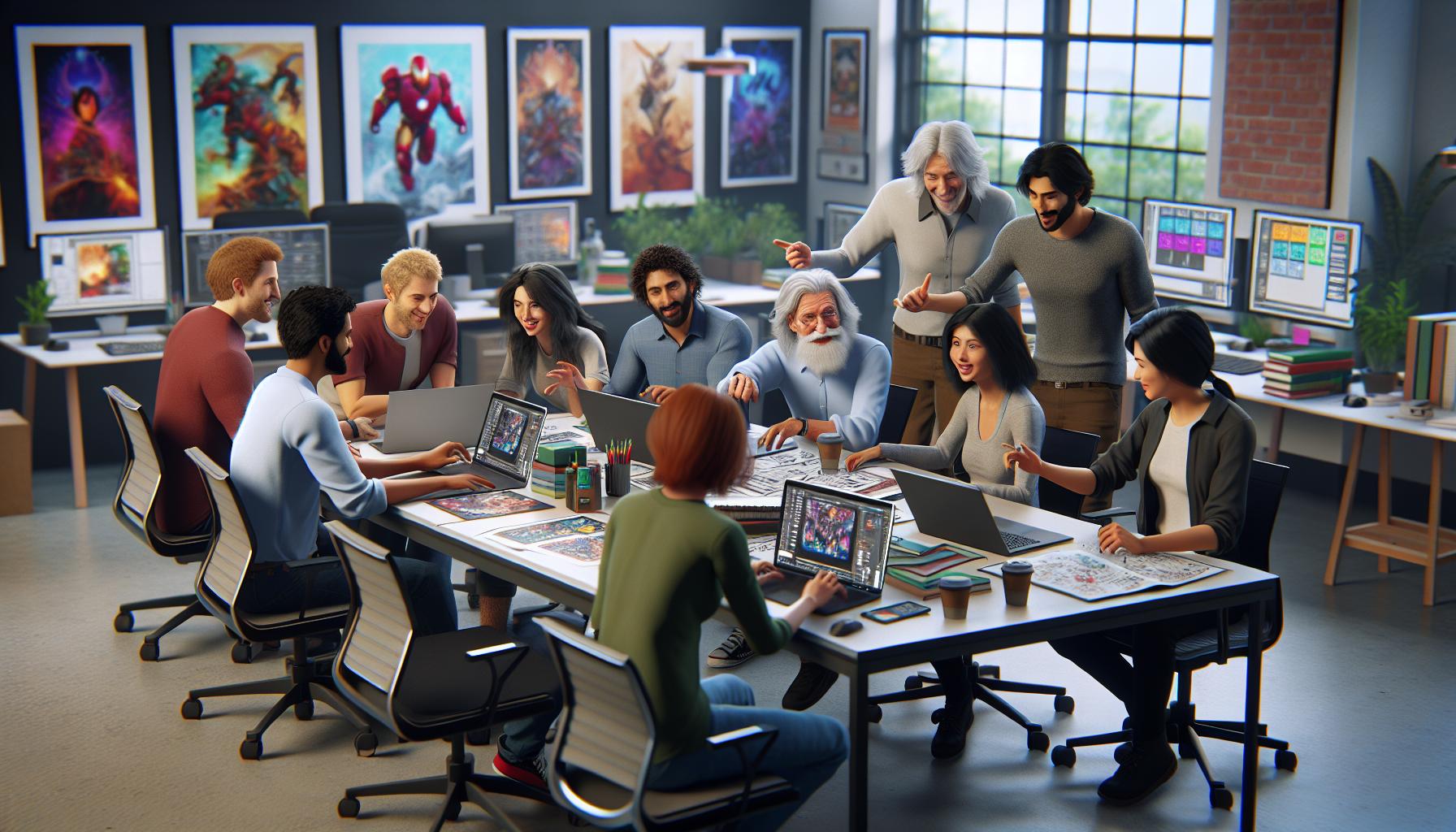Creating a mobile game app isn’t rocket science – though it might feel that way at first! With over 2.2 billion mobile gamers worldwide and app stores bursting with opportunities, there’s never been a better time to jump into game development.
From casual puzzle games to immersive RPGs, the mobile gaming industry continues to evolve at lightning speed. Whether someone’s a coding wizard or just starting their development journey, modern tools and platforms have made it easier than ever to bring gaming ideas to life. With the right approach resources and a dash of creativity anyone can craft an engaging game that captivates players and potentially turns into the next viral sensation.
Understanding Game Development Fundamentals
Game development combines artistic creativity with technical execution to create engaging interactive experiences. The foundation of successful game development rests on understanding core principles that shape the entire creation process.
Game Design Elements
Core game mechanics form the essential framework of player interactions within a game. These mechanics include:
- Gameplay Loop: Define primary actions players perform repeatedly (collecting coins, defeating enemies, solving puzzles)
- Player Progression: Structure achievement systems through levels, skills, or character development
- Game Rules: Establish clear boundaries for player actions in the game world
- Visual Style: Create consistent aesthetics through colors, shapes, animations
- Sound Design: Incorporate audio elements like background music, sound effects, character voices
- User Interface: Design intuitive controls, menus, scoring systems
Choosing Your Game Engine
Game engines provide the technical framework for bringing game concepts to life. Popular mobile game engines include:
- Unity: Supports 2D/3D development with extensive asset store
- Unreal Engine: Delivers high-end graphics with Blueprint visual scripting
- Godot: Offers lightweight open-source solution with built-in scripting
- GameMaker Studio: Specializes in 2D game development
- Corona SDK: Focuses on rapid 2D mobile game creation
| Engine | Best For | Learning Curve | Cost |
|---|---|---|---|
| Unity | Versatile Projects | Moderate | Free to start |
| Unreal | Graphics-heavy Games | Steep | 5% royalty |
| Godot | Independent Developers | Gentle | Free |
| GameMaker | 2D Games | Gentle | Subscription |
| Corona SDK | Mobile-first Games | Moderate | Free |
Planning Your Game App Project

Effective game app development starts with thorough planning to establish clear objectives, timelines, and documentation. Strategic planning minimizes development hurdles and creates a solid foundation for successful game creation.
Setting Project Goals and Timeline
A game development timeline encompasses specific milestones from concept to launch, with realistic deadlines for each phase. Core project goals include target audience demographics, monetization strategy, platform selection (iOS, Android, or cross-platform), and key performance indicators. Breaking down the development process into phases helps track progress:
- Pre-production: 2-4 weeks for concept development
- Core mechanics: 4-8 weeks for basic gameplay implementation
- Asset creation: 6-12 weeks for graphics, sound, and animations
- Testing phase: 4-6 weeks for bug fixes and optimization
- Launch preparation: 2-3 weeks for store submission and marketing
Creating Game Design Documents
Game design documents (GDD) serve as blueprints containing essential specifications for development teams to follow. A comprehensive GDD includes:
- Game overview: Core mechanics, genre, art style
- Technical requirements: Engine choice, development tools, platforms
- Gameplay elements: Character abilities, level design, progression systems
- Asset specifications: Art guidelines, sound requirements, UI layouts
- Feature roadmap: Development priorities, update plans
- Resource allocation: Team roles, external contractors, tools needed
This documentation helps maintain consistency throughout development and provides clear reference points for all team members involved in the project.
Essential Technical Skills Required
Creating a successful game app requires mastering specific technical competencies that form the foundation of game development. These skills enable developers to bring their creative visions to life through code, graphics, and interactive elements.
Programming Languages for Game Development
Game developers leverage different programming languages based on their chosen game engine and platform requirements. C++ powers many high-performance games with its direct hardware access and extensive game development libraries. C# stands as Unity’s primary language, offering a balance of functionality and ease of use. Java dominates Android native game development, while Swift excels in iOS game creation. Python serves as an entry point for beginners through frameworks like Pygame. Lua enhances game scripting capabilities in engines like Corona SDK and LÖVE.
Graphics and Animation Basics
Understanding fundamental graphics concepts empowers developers to create visually appealing game experiences. 2D sprite manipulation involves managing texture atlases, frame sequences, and collision detection. Vector graphics enable scalable assets that maintain quality across different screen sizes. Core animation principles include tweening, keyframing, and sprite sheet implementation. Shader programming allows custom visual effects through vertex and fragment manipulation. Knowledge of UI/UX design patterns ensures intuitive player interactions through proper layout, color theory, and visual hierarchy implementation.
Building Your First Game App
Creating a functional game app requires a systematic approach that begins with setting up the right tools and implementing essential gameplay elements. This section covers the fundamental steps of bringing your game concept to life.
Setting Up the Development Environment
The development environment forms the foundation for game creation through properly configured tools and software. Visual Studio Code serves as an efficient code editor for game development, offering extensions for multiple programming languages. Download the chosen game engine from its official website, ensuring compatibility with your operating system specifications. Install essential development kits:
- Android Studio with SDK tools for Android development
- Xcode for iOS development on Mac systems
- Git for version control management
- Asset creation tools like Photoshop or Gimp
- Sound editing software such as Audacity
Implementing Core Game Mechanics
Game mechanics transform concepts into interactive experiences through precise code implementation. The process starts with creating basic player movement controls using input detection functions. Essential mechanics include:
- Collision detection systems to handle object interactions
- Score tracking mechanisms to record player progress
- Physics implementations for realistic object behavior
- State management for game progression
- Event systems for triggering in-game actions
Mechanics implementation follows an iterative process:
- Code the basic functionality
- Test the mechanic in isolation
- Integrate with other game systems
- Refine based on playtest feedback
These foundational elements establish the core gameplay loop that drives player engagement.
Testing and Quality Assurance
Quality assurance establishes the foundation for a successful game app launch by identifying bugs preventing unintended behaviors securing optimal performance across devices.
Debugging Common Issues
Game development tools offer built-in debugging features to track runtime errors memory leaks performance bottlenecks. Visual Studio’s debugger identifies code-level issues through breakpoints variable inspection call stack analysis. Unity’s Profiler monitors frame rates memory usage asset loading times revealing optimization opportunities. Common debugging practices include:
- Implementing logging systems to track game states events error messages
- Using try-catch blocks to handle runtime exceptions gracefully
- Monitoring memory allocation patterns to prevent leaks
- Testing frame rates under various device conditions
- Validating input handling collision detection physics calculations
- Checking asset loading optimization resource management
User Testing and Feedback
Professional game testers operators detect functionality issues while target audience feedback reveals engagement usability concerns. Testing methodologies include:
- Closed beta testing with selected players to identify core gameplay issues
- A/B testing of different features mechanics difficulty levels
- Analytics integration tracking player behavior retention rates
- Playtesting sessions recording user interactions reactions
- Focus groups providing detailed feedback on specific game elements
- Compatibility testing across multiple devices operating systems
- Performance testing under various network conditions
- Stress testing server infrastructure multiplayer features
The data collected through these methods guides refinements in gameplay mechanics user interface design difficulty balance.
Publishing Your Game App
Publishing a game app requires strategic preparation to maximize visibility and success in app stores. The process involves optimizing store listings and implementing effective marketing strategies to reach target audiences.
App Store Optimization
App store optimization (ASO) enhances a game’s visibility in app marketplaces. Strategic keywords in the title tag boost search rankings, while compelling screenshots showcase gameplay highlights. A concise app description includes relevant search terms in the first 3 sentences. Visual assets follow platform-specific guidelines: iOS App Store requires up to 10 screenshots at specific resolutions, while Google Play Store accepts up to 8 screenshots per device type. Localization of store listings into 5-10 major languages expands the potential audience reach. Performance metrics like install rates, user ratings, and review responses influence app store algorithms.
| Marketing Channel | Average Conversion Rate |
|---|---|
| Social Media | 2.5% |
| Email Marketing | 4.2% |
| Influencer Posts | 3.8% |
| Cross-Promotion | 5.1% |
Monetization Strategies
Game app monetization combines revenue generation with player experience enhancement through strategic implementation of various pricing models. A successful monetization strategy balances profit potential with user engagement to create sustainable income streams.
In-App Purchase Models
In-app purchases generate revenue through digital content sales within the game environment. Premium currency systems let players buy virtual coins or gems to unlock special items characters or power-ups. Consumable items like extra lives energy boosters or special ammunition provide temporary advantages. Season passes offer exclusive content access over specific time periods with rewards unlocking as players progress. Cosmetic items such as character skins emotes or decorative elements appeal to players seeking personalization without affecting gameplay balance.
Advertising Options
Mobile game advertising integrates promotional content through multiple formats to maximize revenue potential. Rewarded video ads offer in-game benefits when players choose to watch complete advertisements with completion rates averaging 85%. Interstitial ads appear between gameplay sessions generating $3-$10 CPM rates across different regions. Banner ads place non-intrusive promotional content along screen edges maintaining continuous visibility. Native ads blend seamlessly with game content through sponsored items or branded power-ups increasing engagement rates by 20-30%. Playable ads let users test other games directly providing conversion rates up to 7% higher than standard video ads.
Conclusion
Creating a successful game app requires dedication passion and a systematic approach. While the journey from concept to launch may seem daunting modern tools and resources have made game development more accessible than ever.
Success in mobile game development isn’t just about coding skills – it’s about combining creativity with technical knowledge market understanding and user engagement. By following proper planning processes mastering essential tools and implementing effective testing and monetization strategies developers can transform their game ideas into engaging apps that resonate with players.
The mobile gaming market continues to grow making it an exciting time to dive into game app development. With determination and the right approach anyone can contribute to this thriving industry and potentially create the next gaming sensation.

